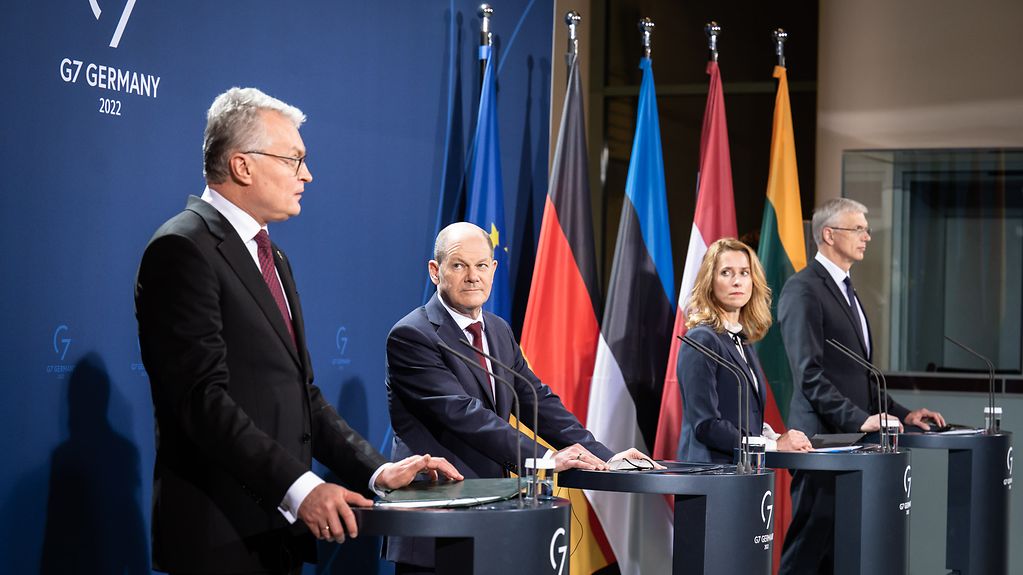Baltic heads of state and government meet the Federal Chancellor
Germany and the Baltic countries are united in the goal of preserving peace in Europe, stressed Federal Chancellor Scholz at his meeting with the heads of state and government of Latvia, Estonia and Lithuania. De-escalation was the current priority, he said.

Federal Chancellor Scholz with Lithuanian President Gitanas Nauseda (l), Estonian Prime Minister Kaja Kallas and Latvian Prime Minister Krišjānis Kariņš.
Photo: Bundesregierung / Steins
“The three Baltic states and Germany are close, reliable partners who are united with us in the EU and in NATO,” said Federal Chancellor Olaf Scholz at a joint press briefing on Thursday prior to talks with Lithuanian President Gitanas Nauseda, Estonian Prime Minister Kaja Kallas and Latvian Prime Minister Krišjānis Kariņš at the Chancellery in Berlin.
Talks aimed at avoiding escalation
The main focus of the meeting was on the Ukraine crisis and how to continue to deal with Russia. What was currently at stake was no less than the prevention of war in Europe, said Federal Chancellor Scholz. He added: “We want to maintain peace and stability on our continent. This is what unites us.”
He said it was important to him personally to analyse the current situation together with the three Baltic heads of state and government and, in particular, to discuss the security interests of the Baltic states.
Impact on security in the Baltic states
“We’re all fully aware that the Baltic States are directly affected by the worrying military activities being pursued by Russia – both on the Ukrainian border and in Belarus,” the Federal Chancellor reiterated.
This is why constant and close dialogue had been going on for months in the EU and NATO in order to tackle this difficult situation. Scholz said: “Our position on this is clear. We are united and determined.” He said he had made this clear earlier in the week at his meeting with US President Joe Biden and subsequently at talks with France and Poland within the framework of the Weimar Triangle.
“De-escalation is the current priority”
The Federal Chancellor explained the dual strategy in dealing with Russia: further military aggression on the part of Russia against Ukraine would entail “very serious political, economic and strategic consequences”. Russia was now called upon to take clear steps to reduce the current tensions in the region, he said. “De-escalation is the current priority,” said the Federal Chancellor.
At the same time, he said, there was a willingness to engage in serious dialogue with Russia on issues of European security. NATO and the OSCE had made concrete proposals to Russia to this effect.
The Federal Chancellor’s travelling diplomacy: “We stand alongside you”
The Federal Chancellor welcomed the fact that it had been possible to hold further talks in Berlin on Thursday within the framework of the Normandy format at the level of foreign policy advisers.
He said that he himself would be travelling to Kyiv to meet President Zelensky at the beginning of next week, before going on to meet President Putin in Moscow the following day. Scholz warned that in the current critical situation, Russia should “not underestimate our unity and determination, as partners in the EU and as allies in NATO. I want to be clear: we take the concerns of our allies very seriously. We stand alongside you.”